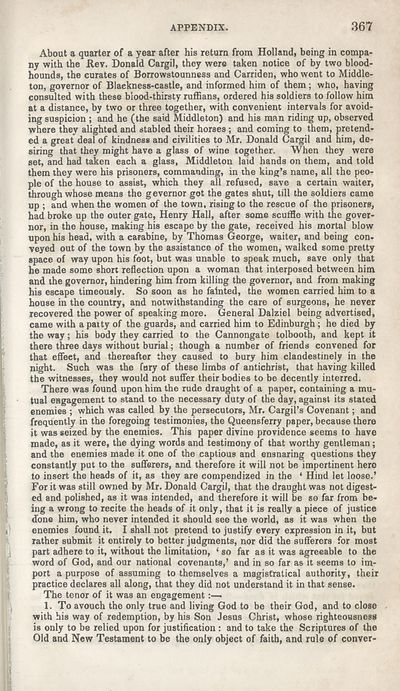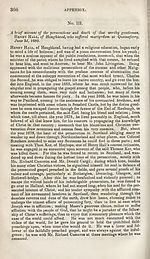Religion & morality > Cloud of witnesses, for the royal prerogatives of Jesus Christ, or, The last speeches and testimonies of those who suffered for the truth in Scotland, in the years 1681-1688, with an appendix, containing the Queensferry paper, Torwood excommunications, &c
(423)
Download files
Complete book:
Individual page:
Thumbnail gallery: Grid view | List view

APPENDIX.
367
About a quarter of a year after his return from Holland, being in compa¬
ny with the Rev. Donald Cargil, they were taken notice of by two blood¬
hounds, the curates of Borrowstounness and Carriden, who went to Middle-
ton, governor of Blaekness-castle, and informed him of them ; who, having
consulted with these biood-thirsty ruffians, ordered his soldiers to follow him
at a distance, by two or three together, with convenient intervals for avoid¬
ing suspicion ; and he (the said Middleton) and his man riding up, observed
where they alighted and stabled their horses ; and coming to them, pretend¬
ed a great deal of kindness and civilities to Mr. Donald Cargil and him, de¬
siring that they might have a glass of wine together. When they were
set, and had taken each a glass, Middleton laid hands on them, and told
them they were his prisoners, commanding, in the king’s name, all the peo¬
ple of the house to assist, which they all refused, save a certain waiter,
through whose means the gevernor got the gates shut, till the soldiers came
up ; and when the women of the town, rising to the rescue of the prisoners,
had broke up the outer gate, Henry Hall, after some scuffle with the gover¬
nor, in the house, making his escape by the gate, received his mortal blow
upon his head, with a carabine, by Thomas George, waiter, and being con¬
veyed out of the town by the assistance of the women, walked some pretty
space of way upon his foot, but was unable to speak much, save only that
he made some short reflection upon a woman that interposed between him
and the governor, hindering him from killing the governor, and from making
his escape timeously. So soon as he fainted, the women carried him to a
house in the country, and notwithstanding the care of surgeons, he never
recovered the power of speaking more. General Dalziel being advertised,
came with a patty of the guards, and carried him to Edinburgh ; he died by
the way; his body they carried to the Cannongate tolbooth, and kept it
there three days without burial; though a number of friends convened for
that effect, and thereafter they caused to bury him clandestinely in the
night. Such was the fury of these limbs of antichrist, that having killed
the witnesses, they would not sufier their bodies to be decently interred.
There was found upon him the rude draught of a paper, containing a mu¬
tual engagement to stand to the necessary duty of the day, against its stated
enemies ; which was called by the persecutors, Mr. Cargil’s Covenant; and
frequently in the foregoing testimonies, the Queensferry paper, because there
it was seized by the enemies. This paper divine providence seems to have
made, as it were, the dying words and testimony of that worthy gentleman;
and the enemies made it one of the captious and ensnaring questions they
constantly put to the sufferers, and therefore it will not be impertinent hero
to insert the heads of it, as they are compendized in the ‘ Hind let loose.’
For it was still owned by Mr. Donald Cargil, that the draught was not digest¬
ed and polished, as it was intended, and therefore it will be so far from be¬
ing a wrong to recite the heads of it only, that it is really a piece of justice
don# him, who never intended it should see the world, as it was when the
enemies found it. I shall not pretend to justify every expression in it, but
rather submit it entirely to better judgments, nor did the sufferers for most
part adhere to it, without the limitation, ‘ so far as it was agreeable to the
word of God, and our national covenants,’ and in so far as it seems to im¬
port a purpose of assuming to themselves a magistratical authority, their
practice declares all along, that they did not understand it in that sense.
The tenor of it was an engagement:—
1. To avouch the only true and living God to be their God, and to close
with his way of redemption, by his Son Jesus Christ, whose righteousness
is only to be relied upon for justification : and to take the Scriptures of the
Old and New Testament to be the only object of faith, and rule of conver-
367
About a quarter of a year after his return from Holland, being in compa¬
ny with the Rev. Donald Cargil, they were taken notice of by two blood¬
hounds, the curates of Borrowstounness and Carriden, who went to Middle-
ton, governor of Blaekness-castle, and informed him of them ; who, having
consulted with these biood-thirsty ruffians, ordered his soldiers to follow him
at a distance, by two or three together, with convenient intervals for avoid¬
ing suspicion ; and he (the said Middleton) and his man riding up, observed
where they alighted and stabled their horses ; and coming to them, pretend¬
ed a great deal of kindness and civilities to Mr. Donald Cargil and him, de¬
siring that they might have a glass of wine together. When they were
set, and had taken each a glass, Middleton laid hands on them, and told
them they were his prisoners, commanding, in the king’s name, all the peo¬
ple of the house to assist, which they all refused, save a certain waiter,
through whose means the gevernor got the gates shut, till the soldiers came
up ; and when the women of the town, rising to the rescue of the prisoners,
had broke up the outer gate, Henry Hall, after some scuffle with the gover¬
nor, in the house, making his escape by the gate, received his mortal blow
upon his head, with a carabine, by Thomas George, waiter, and being con¬
veyed out of the town by the assistance of the women, walked some pretty
space of way upon his foot, but was unable to speak much, save only that
he made some short reflection upon a woman that interposed between him
and the governor, hindering him from killing the governor, and from making
his escape timeously. So soon as he fainted, the women carried him to a
house in the country, and notwithstanding the care of surgeons, he never
recovered the power of speaking more. General Dalziel being advertised,
came with a patty of the guards, and carried him to Edinburgh ; he died by
the way; his body they carried to the Cannongate tolbooth, and kept it
there three days without burial; though a number of friends convened for
that effect, and thereafter they caused to bury him clandestinely in the
night. Such was the fury of these limbs of antichrist, that having killed
the witnesses, they would not sufier their bodies to be decently interred.
There was found upon him the rude draught of a paper, containing a mu¬
tual engagement to stand to the necessary duty of the day, against its stated
enemies ; which was called by the persecutors, Mr. Cargil’s Covenant; and
frequently in the foregoing testimonies, the Queensferry paper, because there
it was seized by the enemies. This paper divine providence seems to have
made, as it were, the dying words and testimony of that worthy gentleman;
and the enemies made it one of the captious and ensnaring questions they
constantly put to the sufferers, and therefore it will not be impertinent hero
to insert the heads of it, as they are compendized in the ‘ Hind let loose.’
For it was still owned by Mr. Donald Cargil, that the draught was not digest¬
ed and polished, as it was intended, and therefore it will be so far from be¬
ing a wrong to recite the heads of it only, that it is really a piece of justice
don# him, who never intended it should see the world, as it was when the
enemies found it. I shall not pretend to justify every expression in it, but
rather submit it entirely to better judgments, nor did the sufferers for most
part adhere to it, without the limitation, ‘ so far as it was agreeable to the
word of God, and our national covenants,’ and in so far as it seems to im¬
port a purpose of assuming to themselves a magistratical authority, their
practice declares all along, that they did not understand it in that sense.
The tenor of it was an engagement:—
1. To avouch the only true and living God to be their God, and to close
with his way of redemption, by his Son Jesus Christ, whose righteousness
is only to be relied upon for justification : and to take the Scriptures of the
Old and New Testament to be the only object of faith, and rule of conver-
Set display mode to:
![]() Universal Viewer |
Universal Viewer | ![]() Mirador |
Large image | Transcription
Mirador |
Large image | Transcription
| Permanent URL | https://digital.nls.uk/132220715 |
|---|
| Description | Thousands of printed books from the Antiquarian Books of Scotland collection which dates from 1641 to the 1980s. The collection consists of 14,800 books which were published in Scotland or have a Scottish connection, e.g. through the author, printer or owner. Subjects covered include sport, education, diseases, adventure, occupations, Jacobites, politics and religion. Among the 29 languages represented are English, Gaelic, Italian, French, Russian and Swedish. |
|---|

